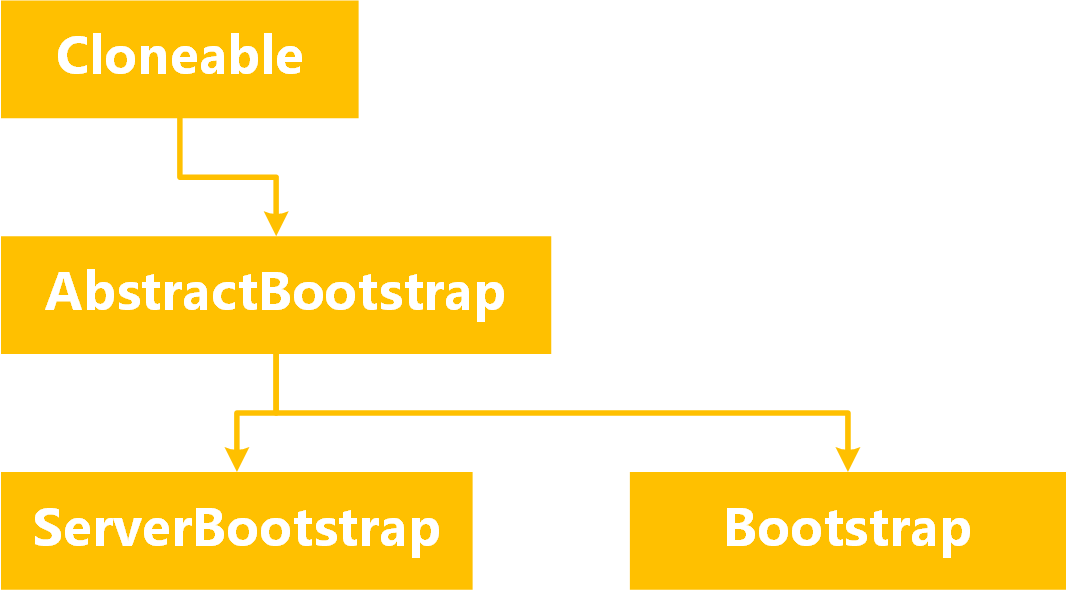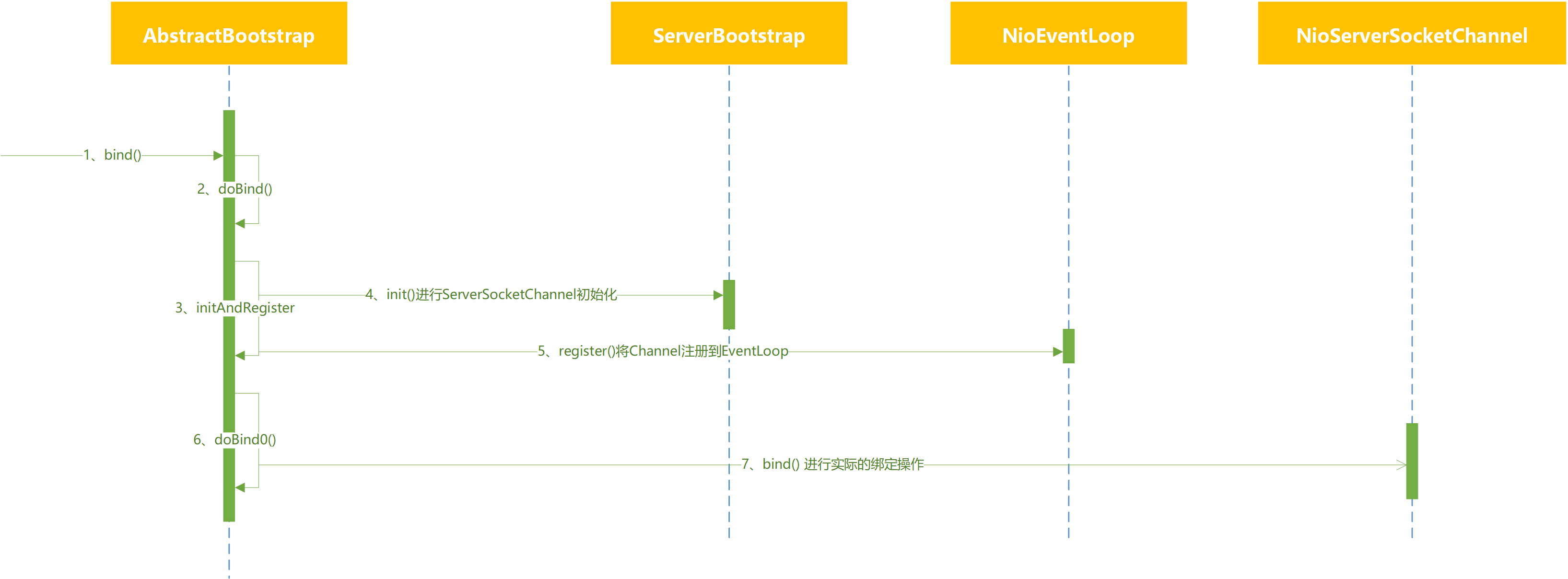-
Notifications
You must be signed in to change notification settings - Fork 3.8k
2019 09 11 netty案例,netty4.1源码分析篇二《ServerBootstrap配置与绑定启动》
作者:小傅哥
博客:https://bugstack.cn - 原创系列专题
沉淀、分享、成长,让自己和他人都能有所收获!
结合上一章节介绍NioEventLoopGroup,本章节继续介绍ServerBootstrap相关代码。
启动NettyServer的模版代码
private void bing(int port) {
EventLoopGroup parentGroup = new NioEventLoopGroup();
EventLoopGroup childGroup = new NioEventLoopGroup();
try {
ServerBootstrap b = new ServerBootstrap();
b.group(parentGroup, childGroup)
.channel(NioServerSocketChannel.class) //非阻塞模式
.option(ChannelOption.SO_BACKLOG, 128)
.childHandler(new MyChannelInitializer());
ChannelFuture f = b.bind(port).sync();
System.out.println("itstack-demo-netty server start done. {关注公众号:bugstack虫洞栈,获取源码}");
f.channel().closeFuture().sync();
} catch (InterruptedException e) {
e.printStackTrace();
} finally {
childGroup.shutdownGracefully();
parentGroup.shutdownGracefully();
}
}- 它们都是继承于AbstractBootstrap,分别负责服务端与客户端;
- ServerBootstrap,服务端用于接收客户端的连接并为接收连接的用户创建Channel通道
- BootStrap,客户端不接收连接,并且是在父通道完成系列操作。
** 类继承结构图:**
1、 处理说明
- 新建NioEventLoopGroup类型的bossGroup和group。bossGroup主要处理服务端接收客户端连接处理,group主要处理读写等I/O事件及任务等;
- 创建ServerBootstrap,其主要对一些处理进行代理,如bind()等操作,其是其他类的一个简单门面;
- channel()方法设置服务端的ServerSocketChannel实现类,本处实现类为NioServerSocketChannel。
- option()方法设置Channel的相关选项,具体查看ChannelOption中的定义;
- localAddress()设置服务端绑定的本地地址及端口;
- handler()设置服务端的对应Channel的Handler;
- childHandler()设置子连接的Channel的Handler;
- bind()及sync()绑定本地地址并同步返回绑定结果;
2、 bing()调用流程
- 调用ServerBootstrap.bind():应用调用ServerBootstrap的bind()操作;
- 调用AbstractBootstrap.bind():调用doBind()对进行bind操作;
- 调用AbstractBootstrap.initAndRegister():利用ChannelFactory.newChannel()实例化NioServerSocketChannel;
- 调用ServerBootstrap.init():对NioServerSocketChannel进行初始化,主要操作如设置Channel相关的选项及属性、设置ChannelHandler为ServerBootstrapAcceptor等,ServerBootstrapAcceptor为inbound类型的ChannelHandler,其为ServerBootstrap的内部类,其主要实现ChannelRead()操作,将客户端的连接注册到EventLoopGroup的EventLoop中。
- 调用NioEventLoop.register():将NioServerSocketChannel注册到bossGroup中。
- 调用AbstractBootstrap.doBind0:将实际的bind操作以任务的形式添加到bossGroup的EventLoop中。
- 调用NioServerSocketChannel.bind():在EventLoop中以任务的形式调用此方法进行实际的bind()操作。
AbstractBootstrap.java | AbstractBootstrap.doBind()
private ChannelFuture doBind(final SocketAddress localAddress) {
final ChannelFuture regFuture = initAndRegister();
final Channel channel = regFuture.channel();
if (regFuture.cause() != null) {
return regFuture;
}
if (regFuture.isDone()) {
// At this point we know that the registration was complete and successful.
ChannelPromise promise = channel.newPromise();
doBind0(regFuture, channel, localAddress, promise);
return promise;
} else {
// Registration future is almost always fulfilled already, but just in case it's not.
final PendingRegistrationPromise promise = new PendingRegistrationPromise(channel);
regFuture.addListener(new ChannelFutureListener() {
@Override
public void operationComplete(ChannelFuture future) throws Exception {
Throwable cause = future.cause();
if (cause != null) {
// Registration on the EventLoop failed so fail the ChannelPromise directly to not cause an
// IllegalStateException once we try to access the EventLoop of the Channel.
promise.setFailure(cause);
} else {
// Registration was successful, so set the correct executor to use.
// See https://github.com/netty/netty/issues/2586
promise.registered();
doBind0(regFuture, channel, localAddress, promise);
}
}
});
return promise;
}
}** 主要流程处理 **
- 调用initAndRegister()初始化Channel并将其注册到bossGroup中的NioEventLoop中;
- 若注册成功,则调用doBind0()进行实际的bind操作;
- 若还未注册,则创建注册结果的监听器及doBind0()的异步结果,若Channel注册成功,则在结果监听器中进行doBind0()操作,并将bind()异步结果这种为成功;否则将在监听器中设置异步结果为失败;
AbstractBootstrap.java | AbstractBootstrap.initAndRegister()
final ChannelFuture initAndRegister() {
Channel channel = null;
try {
channel = channelFactory.newChannel();
init(channel);
} catch (Throwable t) {
if (channel != null) {
// channel can be null if newChannel crashed (eg SocketException("too many open files"))
channel.unsafe().closeForcibly();
// as the Channel is not registered yet we need to force the usage of the GlobalEventExecutor
return new DefaultChannelPromise(channel, GlobalEventExecutor.INSTANCE).setFailure(t);
}
// as the Channel is not registered yet we need to force the usage of the GlobalEventExecutor
return new DefaultChannelPromise(new FailedChannel(), GlobalEventExecutor.INSTANCE).setFailure(t);
}
ChannelFuture regFuture = config().group().register(channel);
if (regFuture.cause() != null) {
if (channel.isRegistered()) {
channel.close();
} else {
channel.unsafe().closeForcibly();
}
}
// If we are here and the promise is not failed, it's one of the following cases:
// 1) If we attempted registration from the event loop, the registration has been completed at this point.
// i.e. It's safe to attempt bind() or connect() now because the channel has been registered.
// 2) If we attempted registration from the other thread, the registration request has been successfully
// added to the event loop's task queue for later execution.
// i.e. It's safe to attempt bind() or connect() now:
// because bind() or connect() will be executed *after* the scheduled registration task is executed
// because register(), bind(), and connect() are all bound to the same thread.
return regFuture;
}** 主要处理流程 **
- 通过ChannelFactory新创建一个Channel;
- 调用ServerBootstrap的init()方法对Channel进行初始化;
AbstractBootstrap.java | AbstractBootstrap.init()
@Override
void init(Channel channel) throws Exception {
final Map<ChannelOption<?>, Object> options = options0();
synchronized (options) {
setChannelOptions(channel, options, logger);
}
final Map<AttributeKey<?>, Object> attrs = attrs0();
synchronized (attrs) {
for (Entry<AttributeKey<?>, Object> e: attrs.entrySet()) {
@SuppressWarnings("unchecked")
AttributeKey<Object> key = (AttributeKey<Object>) e.getKey();
channel.attr(key).set(e.getValue());
}
}
ChannelPipeline p = channel.pipeline();
final EventLoopGroup currentChildGroup = childGroup;
final ChannelHandler currentChildHandler = childHandler;
final Entry<ChannelOption<?>, Object>[] currentChildOptions;
final Entry<AttributeKey<?>, Object>[] currentChildAttrs;
synchronized (childOptions) {
currentChildOptions = childOptions.entrySet().toArray(newOptionArray(0));
}
synchronized (childAttrs) {
currentChildAttrs = childAttrs.entrySet().toArray(newAttrArray(0));
}
p.addLast(new ChannelInitializer<Channel>() {
@Override
public void initChannel(final Channel ch) throws Exception {
final ChannelPipeline pipeline = ch.pipeline();
ChannelHandler handler = config.handler();
if (handler != null) {
pipeline.addLast(handler);
}
ch.eventLoop().execute(new Runnable() {
@Override
public void run() {
pipeline.addLast(new ServerBootstrapAcceptor(
ch, currentChildGroup, currentChildHandler, currentChildOptions, currentChildAttrs));
}
});
}
});
}** 主要处理流程 **
- 如果设置了Channel选项,则调用setChannelOptions()对Channel进行选项设置;
- 如果设置了属性,则将对应属性设置为Channel的属性;
- 设置子Channel的选项及属性;
- 初始化NioServerSocketChannel的ChannelHandler为ServerBootstrapAcceptor,ServerBootstrapAcceptor为inbound类型的ChannelHandler,其主要功能是将已经接受连接的子Channel注册到workerGroup的NioEventLoop中;
AbstractBootstrap.java | AbstractBootstrap.doBind0()
private static void doBind0(
final ChannelFuture regFuture, final Channel channel,
final SocketAddress localAddress, final ChannelPromise promise) {
// This method is invoked before channelRegistered() is triggered. Give user handlers a chance to set up
// the pipeline in its channelRegistered() implementation.
channel.eventLoop().execute(new Runnable() {
@Override
public void run() {
if (regFuture.isSuccess()) {
channel.bind(localAddress, promise).addListener(ChannelFutureListener.CLOSE_ON_FAILURE);
} else {
promise.setFailure(regFuture.cause());
}
}
});
}** 主要处理流程 **
- 将NioServerSocketChannel.bind()操作封装为任务,并将任务提交给其对应的EventLoop进行处理;
ServerBootstrapAcceptor为NioServerSocketChannel的 - ChannelHandler,其类型为Inbound类型;
ServerBootstrapAcceptor.java
private static class ServerBootstrapAcceptor extends ChannelInboundHandlerAdapter {
private final EventLoopGroup childGroup;
private final ChannelHandler childHandler;
private final Entry<ChannelOption<?>, Object>[] childOptions;
private final Entry<AttributeKey<?>, Object>[] childAttrs;
private final Runnable enableAutoReadTask;
ServerBootstrapAcceptor(
final Channel channel, EventLoopGroup childGroup, ChannelHandler childHandler,
Entry<ChannelOption<?>, Object>[] childOptions, Entry<AttributeKey<?>, Object>[] childAttrs) {
this.childGroup = childGroup;
this.childHandler = childHandler;
this.childOptions = childOptions;
this.childAttrs = childAttrs;
// Task which is scheduled to re-enable auto-read.
// It's important to create this Runnable before we try to submit it as otherwise the URLClassLoader may
// not be able to load the class because of the file limit it already reached.
//
// See https://github.com/netty/netty/issues/1328
enableAutoReadTask = new Runnable() {
@Override
public void run() {
channel.config().setAutoRead(true);
}
};
}
@Override
@SuppressWarnings("unchecked")
public void channelRead(ChannelHandlerContext ctx, Object msg) {
final Channel child = (Channel) msg;
child.pipeline().addLast(childHandler);
setChannelOptions(child, childOptions, logger);
for (Entry<AttributeKey<?>, Object> e: childAttrs) {
child.attr((AttributeKey<Object>) e.getKey()).set(e.getValue());
}
try {
childGroup.register(child).addListener(new ChannelFutureListener() {
@Override
public void operationComplete(ChannelFuture future) throws Exception {
if (!future.isSuccess()) {
forceClose(child, future.cause());
}
}
});
} catch (Throwable t) {
forceClose(child, t);
}
}
private static void forceClose(Channel child, Throwable t) {
child.unsafe().closeForcibly();
logger.warn("Failed to register an accepted channel: {}", child, t);
}
@Override
public void exceptionCaught(ChannelHandlerContext ctx, Throwable cause) throws Exception {
final ChannelConfig config = ctx.channel().config();
if (config.isAutoRead()) {
// stop accept new connections for 1 second to allow the channel to recover
// See https://github.com/netty/netty/issues/1328
config.setAutoRead(false);
ctx.channel().eventLoop().schedule(enableAutoReadTask, 1, TimeUnit.SECONDS);
}
// still let the exceptionCaught event flow through the pipeline to give the user
// a chance to do something with it
ctx.fireExceptionCaught(cause);
}
}** ServerBootstrapAcceptor主要实现了以下方法: **
- channelRead():设置子连接的ChannelHandler、设置子连接的Channel选项,设置子连接的Channel属性,将子连接注册的child对应的EventLoop中(即workerGroup的EventLoop中);
- exceptionCaught():若ServerSocketChannel在accept子连接时抛出异常,若ServerSocketChannel的autoRead为true,则设置其为false,即不允许自动接收客户端连接,并延迟1s后再设置其为true,使其允许自动接收客户端连接;
上一篇:netty案例,netty4.1源码分析篇一《NioEventLoopGroup源码分析》
下一篇:netty案例,netty4.1源码分析篇三《Netty服务端初始化过程以及反射工厂的作用》
微信搜索「bugstack虫洞栈」公众号,关注后回复「rpc案例源码」获取本文源码&更多原创专题案例!
小傅哥(微信:fustack),公众号:bugstack虫洞栈 | bugstack.cn - 沉淀、分享、成长,让自己和他人都能有所收获!
🌏 知识星球:码农会锁

实战项目:「DDD+RPC分布式抽奖系统」、专属小册、问题解答、简历指导、架构图稿、视频课程
🐲 头条
-
💥
🎁 Lottery 抽奖系统- 基于领域驱动设计的四层架构的互联网分布式开发实践 -
小傅哥的《重学 Java 设计模式》- 全书彩印、重绘类图、添加内容 -
⭐小傅哥的《Java 面经手册》- 全书5章29节,417页11.5万字,完稿&发版 -
小傅哥的《手撸 Spring》- 通过带着读者手写简化版 Spring 框架,了解 Spring 核心原理 -
🌈小傅哥的《SpringBoot 中间件设计和开发》- 小册16个中间件开发30个代码库
⛳ 目录
💋 精选
🐾 友链
建立本开源项目的初衷是基于个人学习与工作中对 Java 相关技术栈的总结记录,在这里也希望能帮助一些在学习 Java 过程中遇到问题的小伙伴,如果您需要转载本仓库的一些文章到自己的博客,请按照以下格式注明出处,谢谢合作。
作者:小傅哥
链接:https://bugstack.cn
来源:bugstack虫洞栈2021年10月24日,小傅哥 的文章全部开源到代码库 CodeGuide 中,与同好同行,一起进步,共同维护。
这里我提供 3 种方式:
-
提出
Issue:在 Issue 中指出你觉得需要改进/完善的地方(能够独立解决的话,可以在提出 Issue 后再提交PR)。 -
处理
Issue: 帮忙处理一些待处理的Issue。 -
提交
PR: 对于错别字/笔误这类问题可以直接提交PR,无需提交Issue确认。
详细参考:CodeGuide 贡献指南 - 非常感谢你的支持,这里会留下你的足迹
- 加群交流 本群的宗旨是给大家提供一个良好的技术学习交流平台,所以杜绝一切广告!由于微信群人满 100 之后无法加入,请扫描下方二维码先添加作者 “小傅哥” 微信(fustack),备注:加群。

- 公众号(bugstack虫洞栈) - 沉淀、分享、成长,专注于原创专题案例,以最易学习编程的方式分享知识,让自己和他人都能有所收获。

感谢以下人员对本仓库做出的贡献或者对小傅哥的赞赏,当然不仅仅只有这些贡献者,这里就不一一列举了。如果你希望被添加到这个名单中,并且提交过 Issue 或者 PR,请与我联系。

